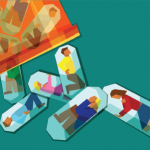 ACR Convergence 2020—Although the reproductive health guideline published by the ACR in 2020 is useful when thinking about medication safety and the risks associated with certain conditions related to reproductive health, Courtney Wells, PhD, MPH, LGSW, of the University of Wisconsin, River Falls, pointed out that providers must also address the psychosocial aspect of care in the decision-making process for women when addressing their reproductive health needs.1
ACR Convergence 2020—Although the reproductive health guideline published by the ACR in 2020 is useful when thinking about medication safety and the risks associated with certain conditions related to reproductive health, Courtney Wells, PhD, MPH, LGSW, of the University of Wisconsin, River Falls, pointed out that providers must also address the psychosocial aspect of care in the decision-making process for women when addressing their reproductive health needs.1
“Human behavior is strongly affected by emotional and social contexts, and healthcare providers should also take these factors into consideration when helping patients make reproductive health decisions,” she said.
Speaking during a session titled Reproductive Health: Meet Women’s Needs, Dr. Wells opened with the example of a rheumatologist telling a patient it is safe to take a medication for a rheumatologic condition while pregnant without considering that her reluctance may be due concern over side effects that may harm her or her baby.
“If a rheumatology provider is aware of potential psychosocial factors at play and engages the patient in a discussion about their concerns, the patient may be more likely to trust the provider and ultimately may have better management of their rheumatic condition during pregnancy,” she said.
The Study
To better understand the psychosocial aspects of reproductive health, Dr. Wells, along with co-presenter Kristine Carandang, PhD, OTR/L, of the University of California, San Diego, are conducting a qualitative secondary analysis of data from three previous studies.
The analysis, which includes 40 pregnant women aged 18–35 years with different rheumatologic conditions (e.g., rheumatoid arthritis, lupus, scleroderma, psoriatic, ankylosing spondylitis, juvenile rheumatoid arthritis/juvenile idiopathic arthritis, etc.), focuses on exploring the key challenges faced by these women and the ways in which they overcame the challenges.
Preliminary findings revealed physical health and psychosocial challenges reported by study participants (see Table 1, below). Dr. Wells underscored that the findings suggest psychosocial dimensions of reproductive health seem to be just as important as the physical dimensions. “Decision making and family planning are woven into the patient’s larger illness narrative,” she said. “It’s more than figuring out if a medication is safe or not.”
| Table 1: Preliminary Findings: Challenges Reported by Pregnant Women with Rheumatologic Conditions | |
| Physical Health |
|
| Psychosocial |
|
Preliminary results also show patients relied on six main strengths: planning and adaptation, disease acceptance, self-care, meaningful activities, self-advocacy and persistence. For support, patients reported reliance on social support, patient-centered providers, patient communities, supportive work and financial resources.
According to Dr. Wells, these data suggest appropriate patient counseling and wraparound services from an interdisciplinary team could mitigate many of these challenges, and providing accurate information early in the family planning process as well as adequate psychosocial support from healthcare providers may help patients feel less overwhelmed by decisions they must make about their reproductive health.
Postpartum Needs
Cheryl Crow, OTR/L, an occupation therapist and founder of Arthritis Life, an educational and support site for people living with arthritis, followed with a talk on the postpartum needs of women with rheumatic disease, underscoring the biopsychosocial demands new motherhood places on women with rheumatic disease.
She emphasized the need for more guidance to help these women navigate the physical, cognitive and social demands that can overwhelm a new mother, as recommended by research.2,3
Citing a 2015 study by Ackerman et al. showing that women with rheumatoid arthritis prefer pragmatic information to help them cope with day-to-day challenges, she urged rheumatologists to look at the full biopsychosocial picture of their patients and refer them to appropriate specialists.4 Such specialists include occupational and physical therapists to help with essential activities of daily living (e.g., protecting joints, conserving energy, modifying daily living materials (e.g., baby carriers and carseats), using hand splints, etc.), and psychosocial services, including psychologists and licensed social workers, to help with emotional and social challenges.
“A multidisciplinary approach is most likely to address the totality of the patient’s needs and to also result in the patient feeling less alone and overwhelmed,” said Crow, who spoke from experience as someone who has lived with rheumatoid arthritis for many years.
Resources
Along with referring patients to the appropriate specialists, rheumatologists can also refer them to patient-focused educational and support sites, such as Arthritis Life, and Mamas Facing Forward, another online community that provides reproductive and parenting support for mothers with chronic illness. Launched in 2018 by Mariah Z. Leach, JD, MS, a writer, patient advocate and mother with rheumatoid arthritis, the website offers resources on a range of issues, including family planning, pregnancy, kids and living with chronic illness such as rheumatologic conditions.
Mary Beth Nierengarten is a freelance medical journalist based in Minneapolis.
References
- Sammaritano LR, Bermas BL, Chakravarty EE, et al. 2020 American College of Rheumatology guideline for the management of reproductive health in rheumatic and musculoskeletal diseases. Arthritis Rheumatol. [online first].
- Carandang K, Pyatak EA, Vigen CLP. Systemic review of educational interventions for rheumatoid arthritis. Am J Occup Ther. 2016 Nov/Dec;70(6): 7006290020p1-7006290020p12.
- Combe B, Landewe R, Daien CI, et al. 2016 Update of the EULAR recommendations for the management of early arthritis. Ann Rheum Dis. 2017 Jun;76(6):948–959.
- Ackerman IN, Jordan JE, Van Doornum S, et al. Understanding the information needs of women with rheumatoid arthritis concerning pregnancy, post-natal care, and early parenting: A mixed-methods study. BMC Musculoskelet Disord. 2015 Aug 19;16:194.





